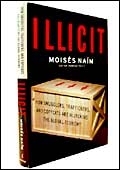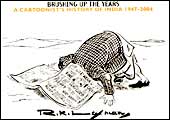 |
ILLICIT
By Mosés Naím
Doubleday
PP: 340
Price: Rs 975 |
Smuggling,
trafficking in contraband and counterfeiting are not exactly recent
activities. As long as there have been national boundaries, these
activities have thrived. Smugglers, traffickers and counterfeiters
take advantage of the very rules, regulations and national boundaries
that guarantee sovereignty to countries. And often it is these
boundaries and rules that ironically thwart a country's authorities-customs,
police and other enforcement agencies-from being able to apprehend
perpetrators of these activities.
Yet, as Moisés Naím, editor
of Foreign Policy and former Venezuelan minister for industry
and trade, writes in Illicit, never has the problem reached the
enormous and dynamic proportions that it has during the current
era of globalisation. The very same factors that have encouraged
and brought about freer flow of ideas and trade across the world
have also promoted the growth of illicit trade. It's the flipside
of the globalisation story, says Naím, "just as crucial
but far less known". Since the 1990s, when technologies made
communication across the world cheap and fast, when borders became
more porous because of the ease of global trade, and tariffs and
restrictions were dismantled, global smuggling, whether it is
in drugs, prostitutes, arms or counterfeit products, soared. As
a result, smugglers became "more international, wealthier
and politically more influential than ever before".
Illicit trade today, says Naím, who
also holds a PhD. from mit, permeates every strata of society.
Children in us schools find it easier to score marijuana, which
is illegal, than buying vodka or cigarettes, which are, well,
legal. Well-heeled business travellers routinely engage escorts
on trips abroad, thus, encouraging transnational trafficking in
prostitutes. Acquiring a fake Louis Vuitton bag from local physical
markets for fake goods across the world or a fake Rolex watch
via the internet is easy as it is common.
While Naím's book may not break new
ground with revelations about the phenomena, it certainly brings
a fresh perspective to a problem that is corroding the global
economy even as it feeds off and grows on the back of licit globalisation.
 |
BRUSHING UP THE YEARS
By R K Laxman
Penguin Viking
PP: 304
Price: Rs 750 |
INDIA THROUGH HIS 'TOONS
When you've been around
for almost 60 years on the pages of a newspaper, illustrating
the funny and the sorry, the bizarre and the pedestrian of everyday
India, you cease to be just a cartoonist. Instead, you become
the voice of the common man. Rasipuram Krishnaswamy Laxman has
been this and more, and which is why his collection of cartoons
from 1947 to 2004 reads like an illustrated history of modern
India. Be it the first general elections or the five-year plans
or the rise and fall of Rajiv Gandhi, Laxman always had a point
to make, and more often than not, he was right. For instance,
he bemoaned the government's policy of encouraging state enterprises
at the cost of private companies, and he saw the mess Rajiv Gandhi
was getting into in Sri Lanka. His Common Man, though never speaking,
was everywhere, watching everything. Although 81 and ailing, Laxman
is still the most popular cartoonist in India. The best part about
Brushing Up, of course, is that even your 10-year-old can flip
through it and get up to speed on India's post-Independence history.
|





